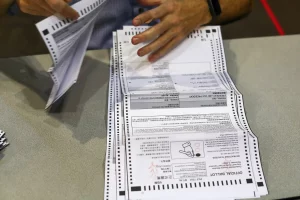Interesting piece recently in the New York Times on politicians in San Francisco, using Chinese names to help them get elected. That city, in fact, has itself an interesting Chinese name: 舊金山 (Jiù Jīn Shān), which translates as “Old Gold Mountain,” referencing the 19th-century gold rush in California. San Francisco has one of the oldest and best-known “Chinatowns” in the US, with many residents speaking Cantonese or Mandarin as their first language. Due to the large number of Chinese-speaking residents, San Francisco has mandated since 1999 that names for political candidates in local elections appear in both English and Chinese. That is no problem for candidates with a Chinese heritage; they likely already have Chinese names. For non-Chinese candidates, they can simply transliterate their English (or Spanish) names. Foreign names are usually transliterated into Chinese by phonetically selecting characters that approximate the sound of the name, as explained in this post from “Fluent in Mandarin.” So “Anderson” becomes 安德森(Āndésēn). It’s not an automatic process, as there are often different characters that can be used for a specific sound.
As pointed out on that site, “The problem with ‘transliterating’ foreign names into Chinese is that they can often sound very unnatural, and not like a native Chinese name.” It’s also the case that the actual meaning of the name (through the characters used) chosen for phonetic similarity may be quite strange (for Chinese speakers). The Chinese transliteration of “Anderson” (安德森)means Install-Virtue-Forest. For foreigners in China, it’s sometimes better to come up with some kind of nickname, as those are frequently used informally in China. In China, I go by the name 老牛 (Lǎo niú), meaning “Old Bull”; that references my age but was particularly chosen as my oldest son (who’s married to a Chinese woman) is “Young Bull” in China.
In San Francisco, it used to be that non-Chinese politicians could come up with their own Chinese names. As it turned out, many did not simply use transliterations of their names, but instead came up with Chinese names that made them sound good. That has now changed, so that Chinese names can only be used if you were born with that name (i.e. are from a Chinese background) or have publicly used that Chinese name for at least 2 years. Otherwise, your name will be transliterated into Chinese phonetically by the election authorities. This has resulted in some candidates having to change the Chinese versions of their names. According to the Times article,
Michael Isaku Begert, who is running to keep his local judgeship, cannot use 米高義, which means in part “high” and “justice,” a name that suggests he was destined to sit on the bench. And Daniel Lurie, who is challenging Mayor London Breed, must scrap the name he had been campaigning with for months: 羅瑞德, which means “auspicious” and “virtue.” Mr. Lurie’s new name, 丹尼爾·羅偉, pronounced Daan-nei-ji Lo-wai, is a transliterated version that uses characters closer to the sound of his name in English but are meaningless when strung together.
According to a piece in the San Franciso Standard, this rule may actually disadvantage ethnic Chinese Americans: “American-born Chinese candidates may be unintended victims of the law, if they don’t have a birth certificate in Chinese that proves they were born with Chinese names.” They may have to supply alternative proof, which meant, according to the article, candidates, “were scrambling to seek old Chinese newspaper articles, Chinese school homework or Chinese family books to find the appropriate records.”
San Francisco is not the only US locale printing ballots in more than one language. According to the Timesarticle:
Certain towns in Alaska must translate ballots into Yup’ik, an Indigenous Alaskan language, while some counties in Arizona must do so in Navajo and Apache. Hundreds of jurisdictions around the nation must translate their ballots into Spanish, while 19 must print them in Chinese, 12 in Vietnamese and four in Korean.
It would be interesting to know if politicians in those areas who have English names also come up with names in those other languages, and whether in the process they try to play language games to make themselves sound good.
